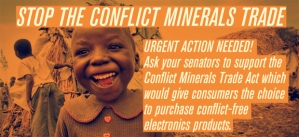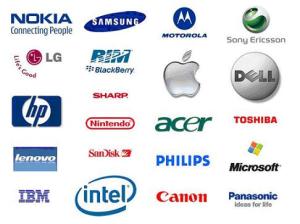On October 19th 2010, at 9pm, we became refugees. homeless wanderers. 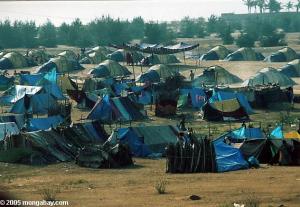
We We gathered on the field, at the front of the university, to set up camp. There were some friends, some strangers, some randoms. It quickly became obvious who among us was a leader, and who was a follower, who was flexible, and who was a bit stiffer, who eagerly integrated themselves into the makeshift team, and who was more of a hesitant outsider.

We began to construct our shantytown with the materials we had available. At this moment we began to build a fort, not an ordinary home, but a structure that would house refugees, a fort that would shelter us from unknown circumstances, a lodging built using teamwork, resourcefulness, and lots of duct tape. We had to be resourceful. We had to work together. Some of us were more talented in architectural and design capacities, and these among us quickly became leaders, surprising us with their creativity and confidence. 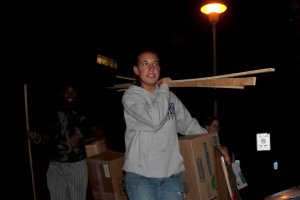
We watched astounded and one by one we immersed ourself in the team and the assembly of the hideout. We did not have all of the materials we needed, so proceeded to scavenge for more. more cardboard, and more wood, from garbage receptacles a sh0rt journey away. We had to be resourceful in our erecting of the fort, and we had to be cohesive in our final goal. 
As we completed our manufacturing of our shelter for the evening, we stepped back and soaked in the image of our team efforts. It was beautiful. We had not known previously that this group of individuals, was capable of combining into one force, to achieve great things. We had become one unit, one body. We were amazed and satisfied with our completed project. The structure was not your average cardboard, wood, duct tape structure. It had windows and doors, a roof, and separate rooms. It was a masterpiece, complete with lighted candles in each room.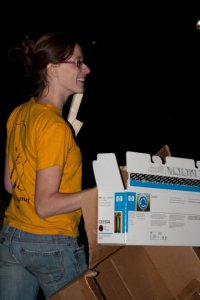
We had no homes, no family. We adapted quickly. This was our home. This was our family. Strangers became friends. Bits and pieces of debri became a humble abode. We settled in and arranged the rest of our temporary village. We became a community, blankets and devices of warmth became public property and sharing was never once questioned. Some of us had more resources than others, or stock of higher quality, but generosity was in the air. All of our food rations were tossed in the center of our shantytown, for the community to indulge in. We had a box of airheads, a bag of cookies, a box of chips, and some trail mix. We consumed our goods rapidly and pleasurably after the exhausting efforts of building and setting up our new homes and town. 
The cold air briskly surrounded us and we huddled around eachother for warmth. We all came from different backgrounds and lifestyles. How did we end up here? Other nomads stopped in throughout the passing hours but refused to stay, going back to their lives. We had to pool our supplies, we had to locate restroom facilities. We had to become comfortable with the uncomfortable. Our colony dwindled, as well as did our resources.
Some members of the tribe had to start to see life through other members eyes. We shared our lives and lifestyle choices with one another. We temporarily fled our stomping ground to embark on a short adventure to gain more nutrients and necessities. Two members of the pack escorted the freshly formed community to a new location and began to scavenge for more food for their current relatives. We were adequately satisfied in our efforts and made our way back to our tent city. Some had to make a pitstop to cleanup, some had to return to the dumpsters to locate a crucial misplaced communication device. We all eventually reappeared at the site. We proceeded to drift off into our individual head trips and hibernations together in our residences.
It wasnt hard to lose consciousness after our tiring efforts and adventures. We were awakened around 5am to a frigid spurting of water. I was immersed in chills and moisture that had intruded into my teepee from the outside environment. 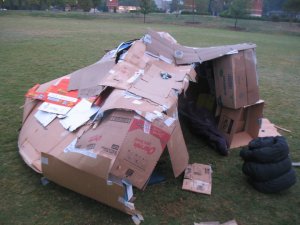 Those in the cardboard hut were soaked as well. Some of our homes were more durable than others, and some of us were more easily and rapidly removed from dormancy. It was unexpected, it was shocking, it was the unsettling life of a refugee.
Those in the cardboard hut were soaked as well. Some of our homes were more durable than others, and some of us were more easily and rapidly removed from dormancy. It was unexpected, it was shocking, it was the unsettling life of a refugee.
As morning proceeded to creep over us, we realized that despite our bewilderment and debilitation, we had to start our day, and continue with life. We reluctantly collected our belongings and expressed our parting remarks. We separated and wandered away in small herds, forever changed by the evenings experiences.
This was the STAND Refugee for a Night Campout.
There are 35 million refugees in the world today.
We chose to become refugees for one night. Chose. For One night.
We did have the option to leave, to go to our real homes, families, places of warmth, and to go back to all of our abundant resources. 
These 35 million people? They dont choose this. It is thrown upon them. It attacks them without warning and their lives, homes, safety, and futures, are forever, immediately, drastically, changed.
Its not usually a temporary happenstance, it usually becomes their lives. They are not refugees for a night. They are refugees for an undetermined amount of time in their future, and maybe for the rest of their lives. 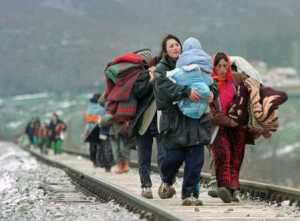 It is a life of danger, a life of chaos, a life of terrible surprises.
It is a life of danger, a life of chaos, a life of terrible surprises.
We should thank God everyday for everything that we have. That we are not refugees. But also we should ask him to remind us to never stop speaking up for those who are voiceless.
For those with no home on this planet. For those who wander no by choice, but by force. For every individual Man, Woman, and child in our world who does not know what they will eat next or where they will sleep, or what the likelihood is that they will wake up tommorow. 
We must never stop advocating for them, or fail to note the seriousness and the brutality of their daily lives, the longing and the emptiness.
We must never stop saying thank you, and never stop protesting for our fellow humans who are refugees.  Stephanie Mauvlyn Braun
Stephanie Mauvlyn Braun










